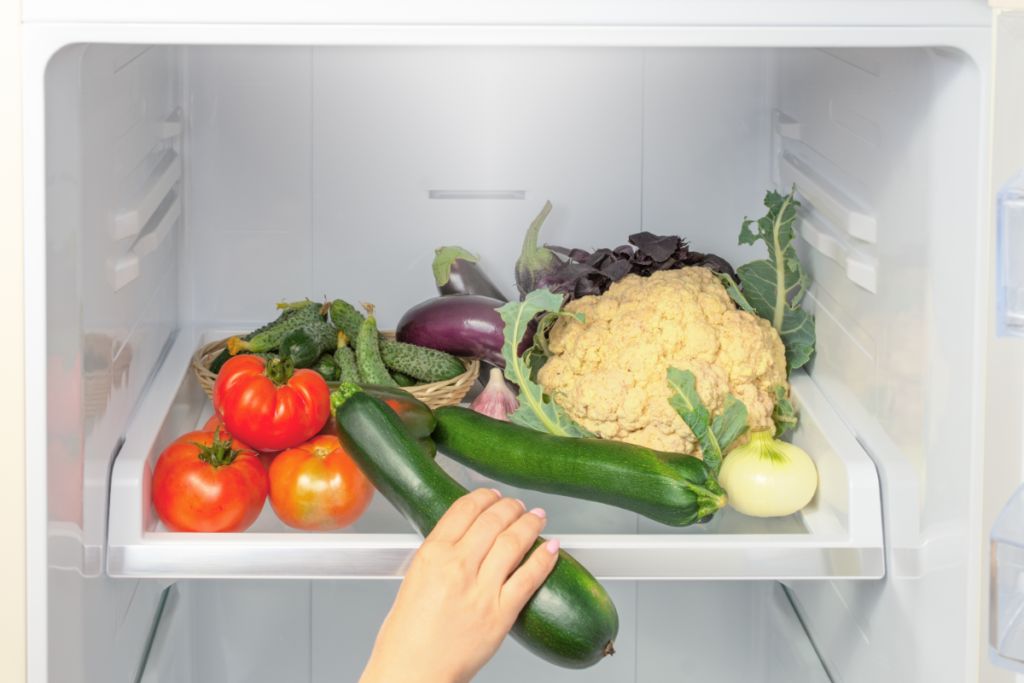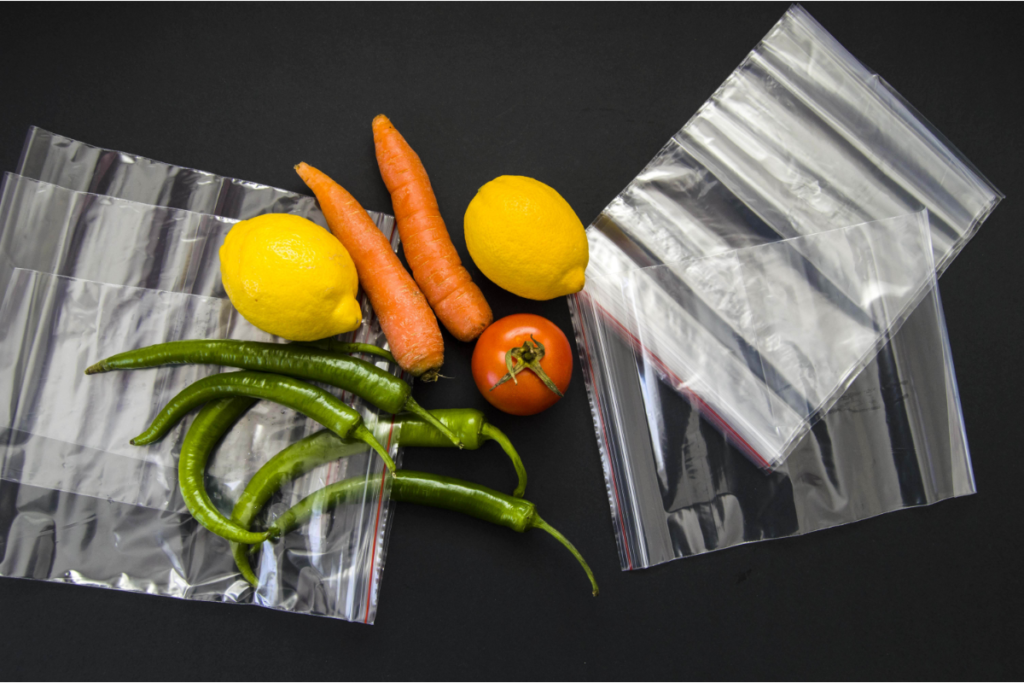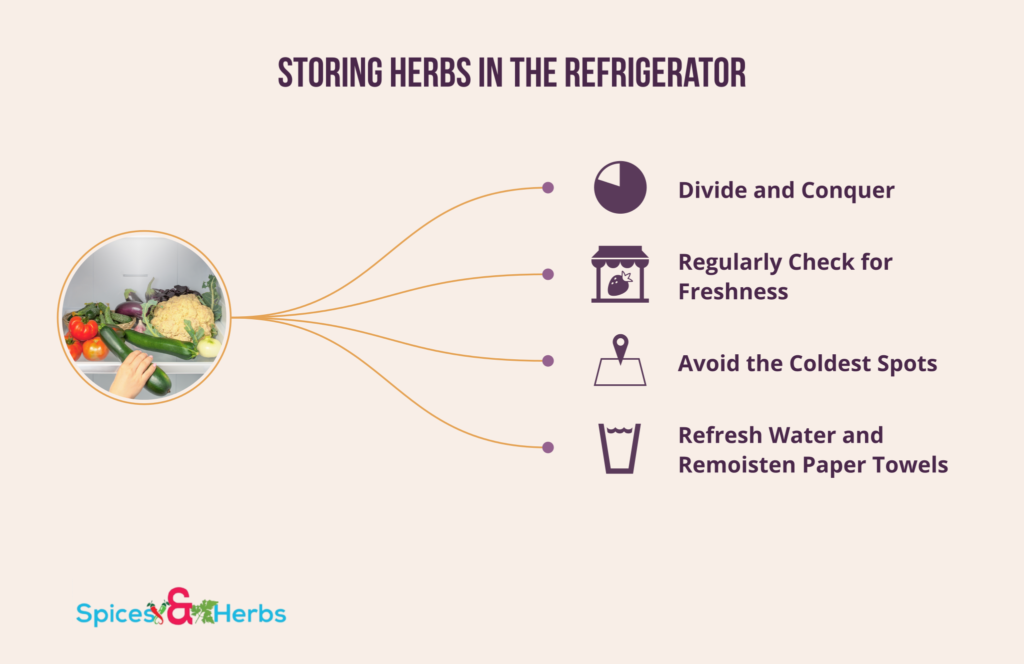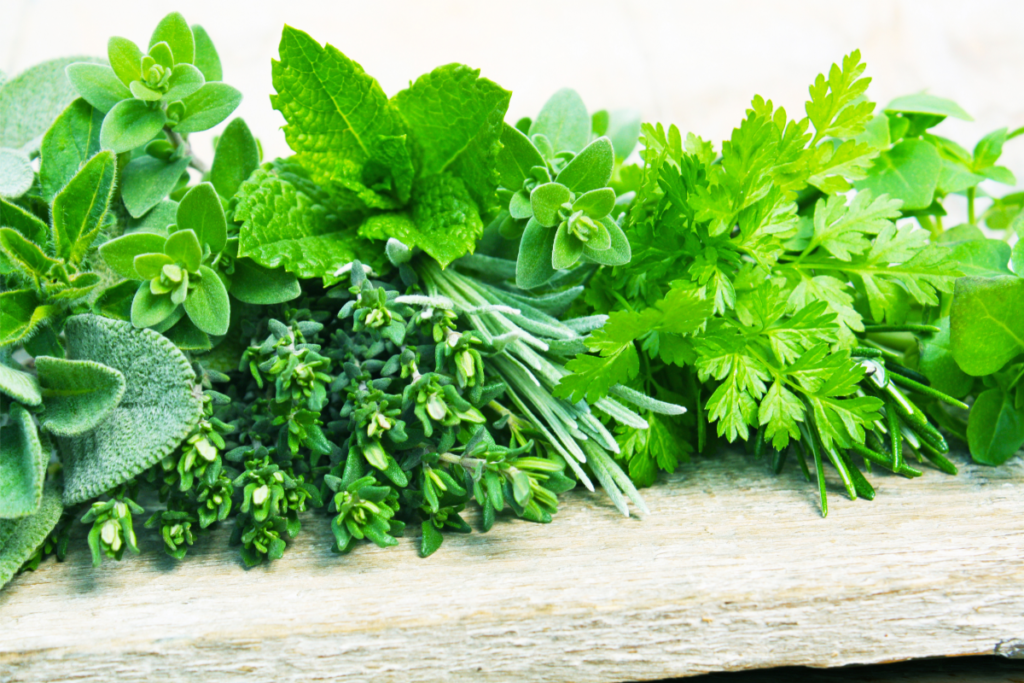Herbs are a great way to add taste and perfume to any meal, but maintaining their best may be a culinary challenge. For herb lovers, storing herbs in the refrigerator might be a useful ally in this situation. Herbs may have their shelf life greatly increased and their flavor and color maintained by storing them in the refrigerator. We’ll go into the key methods and strategies in this topic investigation to help you get the most out of your herbs and make sure they’re on hand for your cooking endeavors. Let’s go out on this adventure to learn how to maintain accessible and fresh herbs in your own kitchen.
Why Store Herbs in the Refrigerator?

Properly storing herbs in the refrigerator offers numerous benefits that help to preserve their freshness and extend their shelf life. By storing herbs in the fridge, you can maintain their flavor, aroma, and vibrant color for longer periods, reducing waste and ensuring they are always ready to enhance your favorite recipes.
- Maintaining Freshness: Herbs are highly perishable and can spoil quickly if not stored properly. The refrigerator provides a cool and controlled environment that helps to slow down the decay process, allowing herbs to stay fresher for a longer time.
- Extending Shelf Life: Storing herbs in the refrigerator can significantly extend their shelf life compared to storing them at room temperature. By following the correct storage methods, herbs that would typically last only a few days can now stay fresh for weeks, allowing you to use them whenever you need.
- Preserving Flavor and Aroma: The cold temperature of the refrigerator helps to preserve the natural oils and volatile compounds that give herbs their distinct flavor and aroma. By storing herbs in the fridge, you can ensure they retain their full flavor profile, allowing you to add freshness to your dishes.
- Preventing Wilting and Drying Out: Herbs that are not stored properly can quickly wilt and dry out, making them less enjoyable to use in cooking. Storing herbs in the refrigerator helps to maintain their moisture content, keeping them hydrated and crisp so they are always in the best condition for use.
Overall, storing herbs in the refrigerator is a simple and effective way to preserve their freshness, extend their shelf life, and ensure that you always have flavorful ingredients. By following the guidelines for herb storage in the fridge, you can enjoy the benefits of preserved herb freshness and elevate the taste of your culinary creations.
Selecting Fresh Herbs for Refrigeration
When storing fresh herbs in the refrigerator, selecting high-quality herbs is key to maintaining their freshness and flavor. Follow these tips to choose the best herbs for storage:
- Look for herbs that are vibrant in color, with no signs of wilting or browning. Fresh herbs should have firm stems and leaves.
- Avoid herbs with yellow or blackened leaves, as these are indications of decay.
- Consider the aroma of the herbs. Fragrant herbs generally have a stronger flavor and will enhance your recipes.
By choosing fresh and high-quality herbs, you can ensure they will last longer in the refrigerator and retain their taste and aroma.
Preparing Herbs for Refrigeration

Properly cleaning and preparing your herbs before refrigeration is essential for extending their freshness and maintaining flavor. Follow these simple steps to ensure your herbs are ready for storage:
- Clean the herbs: Remove any twist ties or rubber bands from the herbs and gently wash them under running water to remove dirt and debris. Take care not to bruise or damage the delicate leaves.
- Dry the herbs: After washing, shake off excess water and pat the herbs dry with a clean dish towel or use a salad spinner. It’s important to remove as much moisture as possible to prevent the growth of bacteria and prolong the freshness of the herbs.
- Trim and bundle: Trim the bottom of the herb stems to remove any bruised or wilted parts. Then, bundle the herbs and secure them with a twist tie or rubber band. It will help to keep them organized and prevent them from becoming tangled or messy in the refrigerator.
Following these simple steps, you can ensure that your herbs are properly cleaned, dried, and bundled, ready for storage in the refrigerator. Taking the time to prepare your herbs correctly will help to maintain their quality and extend their shelf life.
Herb-Specific Refrigeration Guidelines
When it comes to storing herbs in the refrigerator, different types require different methods to maintain their freshness. Whether you’re working with soft herbs like cilantro and mint or hard herbs like rosemary and thyme, here are some herb-specific storage tips to keep in mind:
👉Storing Soft Herbs:
- Soft herbs, such as cilantro, parsley, and mint, should be stored in a jar or container filled with 1 to 2 inches of water.
- Place a clear plastic bag over the top of the leaves to create a humid environment.
- Store the jar in the refrigerator to keep the herbs hydrated and fresh.
👉Storing Hard Herbs:
- You can loosely wrap hard herbs like rosemary, thyme, and oregano in a damp paper towel.
- Place the wrapped herbs in a tightly sealed container in the refrigerator.
Following these herb-specific storage guidelines, you can ensure that your herbs stay fresh and flavorful for longer, ready to be used in your culinary creations.
General Tips for Storing Herbs in the Refrigerator

When it comes to storing fresh herbs in the refrigerator, some general tips can help maximize their shelf life and maintain their freshness. Following these guidelines, you can ensure that your herbs stay vibrant and flavorful for longer periods.
✔️Divide and Conquer
Divide your herbs into smaller batches and store them separately. This helps to prevent cross-contamination and preserve the individual flavors of each herb. You can use resealable bags or small containers to keep them organized and easily accessible.
✔️Regularly Check for Freshness
Even with proper storage, herbs can still wilt or spoil over time. Regularly check for any wilted or spoiled leaves and remove them promptly. It will help maintain the freshness of the remaining herbs and prevent them from affecting others.
✔️Avoid the Coldest Spots
While refrigeration is necessary for herb storage, it’s important to keep them away from the coldest spots in the fridge. Excessive cold exposure can cause herbs to freeze or become damaged. Find a spot in your refrigerator that maintains a cool but not freezing temperature.
✔️Refresh Water and Remoisten Paper Towels
If you’re storing soft herbs in water or hard herbs in damp paper towels, refresh the water or moisturize the towels regularly. It helps to maintain the herbs’ hydration and prevent them from drying out, keeping them fresh and ready to use.
By following these general refrigeration tips, you can extend the shelf life of your fresh herbs and ensure that they remain flavorful and vibrant for all your culinary inspirations.
Creative Ways to Storing Herbs in the Refrigerator
Once you have successfully stored your herbs in the refrigerator, it’s time to explore the various creative ways you can use them to enhance the flavors of your dishes. Here are some culinary herb ideas to inspire your cooking:
📌Add Fresh Herbs to Salads and Soups
Chopped fresh herbs can add a burst of freshness and vibrancy to your salads and soups. Whether it’s parsley, cilantro, or mint, these herbs can elevate the flavor profile of your dishes and make them more delightful.
📌Infuse Oils, Vinegars, and Butter
Take your cooking to the next level by infusing oils, vinegar, or butter with herbs. By steeping the herbs in these ingredients, you can create flavorful bases that add depth and complexity to your recipes. Use them as dressings, marinades, or for sautéing vegetables and proteins.
📌Make Herb-Infused Ice Cubes
Are you looking for a refreshing twist to your beverages? Create herb-infused ice cubes by placing fresh herbs in an ice cube tray, filling them with water, and freezing them. These herb-infused ice cubes can be used in cocktails, iced teas, or flavored water, giving your drinks a unique herbal twist.
📌Blend and Freeze Herb Mixtures
If you have an abundance of herbs, blend them with oil or water and freeze the mixture in ice cube trays. Once frozen, transfer the herb cubes to a freezer bag for convenient portions. This way, you’ll always have the perfect amount of herbs ready to use in your recipes, even during the off-season.
With these creative ideas, you can fully utilize the stored herbs in your refrigerator and add a touch of freshness and flavor to your culinary creations. So get creative, experiment with different herb combinations, and elevate your cooking.
Troubleshooting Common Herb Storage Issues
Storing herbs in the refrigerator is generally a reliable method for preserving their freshness. However, there may be some common issues that can arise during the storage process. Understanding these problems and how to address them will help you avoid herb spoilage and maintain the quality of your stored herbs.
◼️Mold Development
The presence of mold is a concern when storing herbs in the refrigerator. In order to prevent mold growth, it’s essential to ensure that your herbs are adequately dried before refrigeration. Shake off any excess water and pat the herbs dry using a clean dish towel or a salad spinner. Removing as much moisture as possible will inhibit the growth of mold and bacteria, preserving the freshness of the herbs.
◼️Wilted Herbs
If your refrigerated herbs become wilted, there are a few simple steps you can take to refresh them. Submerge the stems in a glass of cold water for a short period, usually about 10 to 15 minutes. This water bath will help rehydrate the wilted herbs and restore their crispness. Afterward, gently pat them dry and return them to the refrigerator. This method can help revive wilted herbs and extend their usability.
◼️Browning or Blackened Leaves
If you notice browning or blackened leaves on your stored herbs, it’s crucial to remove them promptly. These decaying leaves can release harmful enzymes that accelerate spoilage. Carefully pluck off the affected leaves and discard them. Transfer the remaining herbs to a fresh container, ensuring that it’s clean and dry. This simple step will help maintain the quality of your herbs and prevent further decay.
By troubleshooting these common herb storage issues, you can prevent spoilage, maintain the freshness of your herbs, and enjoy their vibrant flavors for an extended period.
Herb Preservation Alternatives

While storing herbs in the refrigerator is a popular method for preserving their freshness, there are alternative storage methods available. Storing herbs in the refrigerator is a great option for extending their shelf life and ensuring you have a supply of fresh herbs even when they are out of season.
🌿Freezing Herbs
Freezing herbs is a simple and effective way to preserve their flavor and aroma. Start by washing and drying the herbs thoroughly to remove dirt or moisture. Next, remove the leaves from the stems and chop them into small pieces. Place the chopped herbs into ice cube trays and fill each compartment with water or olive oil, depending on your preference.
Once the herbs are frozen, transfer the herb cubes into a labeled, resealable freezer bag. This will help you keep track of the different herbs and make it easier to portion out smaller amounts when needed. Frozen herbs can be added directly to soups, stews, sauces, and other dishes during cooking, providing a burst of fresh flavor.
🌿Other Herb Preservation Methods
In addition to freezing, there are other methods you can explore to preserve your herbs. Drying herbs is a traditional method that involves air-drying or using a dehydrator to remove moisture and preserve their flavor. Once dried, you can crush the herbs and store them in airtight containers to use as needed.
You can also preserve herbs by infusing them into oils or vinegars. This method involves steeping the herbs in the liquid to extract their flavors. The infused oil or vinegar can be used in dressings, marinades, or as a finishing touch to your dishes.
Experiment with different herb preservation methods to find the best one for you. Whether you choose to freeze, dry, or infuse herbs, these alternative storage methods will help you extend the shelf life of your herbs and ensure that you always have fresh flavors at your fingertips.
Benefits of Storing Herbs in the Refrigerator
Properly storing herbs in the refrigerator offers several advantages that can enhance your culinary experience. Here are the benefits of proper herb storage:
- Extended Shelf Life: Storing herbs in the refrigerator helps to extend their freshness, allowing you to use them for longer periods. This not only reduces waste but also saves you money as you can enjoy your herbs over an extended period.
- Always Fresh and Ready to Use: By preserving the freshness of your herbs, you can always have them on hand to enhance the flavor of your dishes. Proper storage prevents herbs from wilting, drying out, or losing their vibrant color, ensuring they are always ready to use whenever needed.
- Flavorful Culinary Creations: Storing herbs properly allows you to experiment with different herb combinations and incorporate their unique flavors into your recipes. Whether adding basil to a homemade pasta sauce, cilantro to a refreshing salsa, or rosemary to a roasted chicken, fresh herbs bring a touch of freshness and vibrancy to your meals.
By knowing how to store herbs correctly, you can ensure that you always have a steady supply of fresh herbs for cooking. Whether you grow your herbs or buy them from the grocery store, proper storage will help you maximize their flavor and aroma, elevating your dishes to new heights.
╸Maximizing Herb Freshness╸
To maximize the freshness and quality of your herbs, follow these tips:
- Choose high-quality herbs: Select fresh herbs with vibrant colors, firm stems, and no signs of wilting or decay.
- Clean and dry herbs properly: Gently wash the herbs and remove excess moisture before storing them to prevent the growth of bacteria.
- Follow herb-specific storage guidelines: Different herbs have different storage requirements, so ensure you store them accordingly. Soft herbs like cilantro and mint should be stored in water, while you can wrap hardier herbs like rosemary and thyme in a damp paper towel.
- Regularly check for wilting or spoiled leaves: Remove any wilted or spoiled leaves to maintain the freshness of the remaining herbs.
- Store herbs in the optimal location within the fridge: Keep herbs away from the coldest spots to avoid excessive cold exposure.
- Consider freezing herbs for longer-term storage: Freezing herbs can be a great alternative if you want to preserve them for an extended period.
By following these tips, you can ensure that your herbs stay fresh and flavorful, making every dish you create a culinary delight.
Tips for Maximizing Herb Freshness

To ensure that your herbs stay fresh and flavorful for as long as possible, follow these expert tips:
🍃Choose High-Quality Herbs
- Select herbs that are vibrant in color, with firm stems and leaves, and no signs of wilting or browning.
- Avoid herbs with yellow or blackened leaves, as these are indications of decay.
🍃Properly Clean and Dry Herbs
- Gently wash the herbs under running water to remove dirt and debris.
- Shake off excess water and pat them dry with a clean dish towel or use a salad spinner.
- Removing moisture helps prevent the growth of bacteria and dirt, preserving the herbs’ freshness.
🍃Use Herb-Specific Storage Guidelines
- You should store soft herbs like cilantro, parsley, and mint in a jar or container filled with water. Place a plastic bag over the top to create a humid environment.
- Basil is best stored on the counter in indirect sunlight.
- You can loosely wrap hard herbs like rosemary, thyme, and oregano in a damp paper towel and store them in a tightly sealed container in the fridge.
🍃Regularly Check for Wilting or Spoiled Leaves
- Inspect your stored herbs regularly and remove any wilted or spoiled leaves to maintain the freshness of the remaining herbs.
🍃Optimal Storage Location
- Avoid placing herbs in the coldest spots of the refrigerator, as excessive cold exposure can negatively affect their quality.
🍃Consider Freezing Herbs
- If you want to extend the shelf life of your herbs even further, consider freezing them.
- Wrap hardy herbs in a damp paper towel and store them in a labeled resealable freezer bag.
- Blend soft herbs with oil or water and freeze the mixture in ice cube trays or freezer bags.
By following these tips, you can maintain the quality and extend the shelf life of your herbs, ensuring that you always have fresh and flavorful ingredients to enhance your culinary creations.
Frequently Asked Questions
Do herbs need to be wrapped in paper towels or plastic before refrigerating?
Yes, it’s a good idea to wrap herbs in a damp paper towel or place them in a plastic bag before refrigerating. This helps to keep them fresh and prevent wilting.
How can I prevent herbs from wilting or turning black in the fridge?
To prevent wilting or blackening, make sure herbs are dry before refrigerating. Store them in a container with a lid or a plastic bag, and keep them in the crisper drawer of your fridge.
Can I store herbs in the same drawer as fruits and vegetables in the fridge?
It’s best to avoid storing herbs with fruits like apples and bananas, as they release ethylene gas, which can harm the herbs. Instead, keep herbs in a separate drawer or container.
Can I store herbs in the fridge with their roots intact, like a bouquet?
Yes, you can store some herbs with their roots in a glass of water, similar to a bouquet. This can keep them fresh longer, especially for herbs like cilantro and parsley.
What’s the best way to revive wilted herbs stored in the refrigerator?
To revive wilted herbs, trim the stems, place them in a glass of water, and put them back in the fridge for a little while. They should perk up after a few hours.
Final Words
After delving into the world of storing herbs in the refrigerator, I can’t help but feel a sense of gratitude for the knowledge I’ve gained. It’s incredible how a little extra care and attention can make such a big difference in preserving the flavor and freshness of these wonderful, aromatic herbs. With the right techniques, we can savor the vibrant tastes and colors that herbs bring to our dishes.
No more wilted or forgotten herbs at the back of the fridge, but rather a kitchen filled with the scents of basil, mint, and parsley, ready to enhance our culinary creations. Storing herbs in the refrigerator has become a small yet impactful ritual that brings joy and a burst of life to my cooking, and I encourage everyone to try it. It’s a simple practice that has made a difference for me, and I hope it will do the same for you. Happy cooking!

